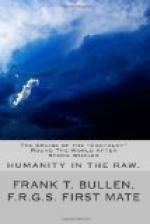But previous experience of boobies’ eggs in other places had not disposed me to seek them where others were to be obtained, and as I had seen many of the well-known frigate or man-o’-war birds hovering about, we set out to the other side of the island in search of the breeding-place.
These peculiar birds are, I think, misnamed. They should be called pirate or buccaneer birds, from their marauding habits. Seldom or never do they condescend to fish for themselves, preferring to hover high in the blue, their tails opening and closing like a pair of scissors as they hang poised above the sea. Presently booby—like some honest housewife who has been a-marketing—comes flapping noisily home, her maw laden with fish for the chicks. Down comes the black watcher from above with a swoop like an eagle. Booby puts all she knows into her flight, but vainly; escape is impossible, so with a despairing shriek she drops her load. Before it has touched the water the graceful thief has intercepted it, and soared slowly aloft again, to repeat the performance as occasion serves.
When we arrived on the outer shore of the island, we found a large breeding-place of these birds, but totally different to the haunt of the boobies. The nests, if they might be so called, being at best a few twigs, were mostly in the hollows of the rocks, the number of eggs being two to a nest, on an average. The eggs were nearly as large as a turkey’s. But I am reminded of the range of size among turkeys’ eggs, so I must say they were considerably larger than a small turkey’s egg. Their flavour was most delicate, as much so as the eggs of a moor-fed fowl. We saw no birds sitting, but here and there the gaunt skeleton forms of birds, who by reason of sickness or old age were unable to provide for themselves, and so sat waiting for death, appealed most mournfully to us. We went up to some of these poor creatures, and ended their long agony; but there were many of them that we were obliged to leave to Nature.




